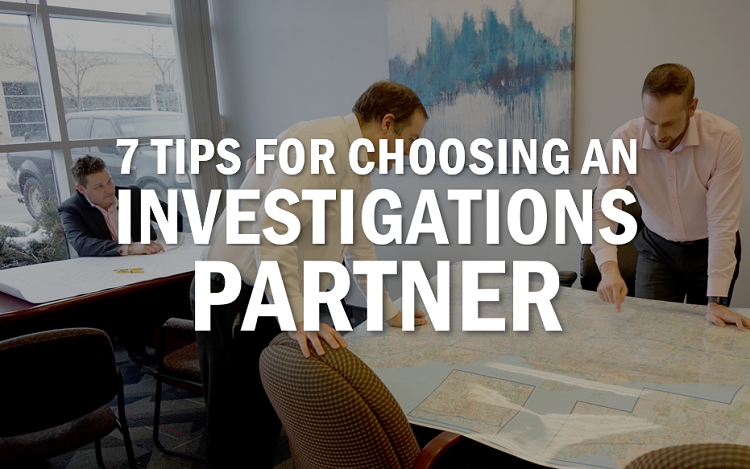
Price is important. So are a lot of other factors.
No one likes it, but it’s part of business: Sooner or later, almost every company finds that it needs to conduct an investigation to uncover potential wrongdoing by management, employees, suppliers, vendors or other third parties.
Investigations don’t have to be painful. With the right partner, investigations can run smoothly, efficiently, and leave your company functioning more productively – and profitably – than before. But there are lots of ‘investigation’ companies out there. How do you choose the right partner for your organization?
Here are our tips for choosing the right one for you.
Know what types of investigations you need.
This can be tricky, because many times you won’t know what you need until you need it. However, it’s possible for most companies to at least draw some broad outlines: Businesses that depend on technology and storing sensitive data may need a partner who can address loss or theft of proprietary information; insurance companies often need to conduct surveillance-based investigations; companies involved in mergers and acquisitions tend to need research and financial specialists; government or other regulated organizations often need to address fraud or corruption concerns.
Different investigations companies tend to specialize in certain areas; knowing what you’re likely to need will help you identify which partner has the right skills and experience.
Think beyond the RFP process.
Putting an RFP out to tender can be a useful way of surveying the investigations landscape, but common RFP questions like how long a company has been in business, a list of their top 10 clients, or whether they offer customized billing systems won’t really tell you if an investigations company is going to be able to deliver the results you need over the long term. Setting up 1-hour meetings with 5-10 investigations companies (preferably by visiting their offices) will do a better job of helping you identify the right partner, and will ultimately take less time than reviewing a whole stack of 50-page RFP responses).
Think less about ‘price’ and more about ‘ROI’.
There is often a tendency, with investigations, to focus on the hourly rate of the investigator(s) involved. This can be useful – but it’s not the whole picture. An effective partner will conduct investigations efficiently, thoroughly, and report findings in a way that are actionable and, where necessary, can withstand legal scrutiny. Investigations with a low hourly rate but which take longer, or aren’t useful to the business, are more expensive in the end.
Know who you’re getting.
Most larger investigations firms use a combination of full-time, permanent staff investigators and contract-based investigators as needed. You’ll want to make sure all the investigators involved in your projects are licensed, experienced, participate in ongoing education, and are experienced in the fields most relevant to your needs. You'll also want to know if their investigators and/or management hold professional memberships and certifications, and how long they've been working with the company. A good investigations partner won’t hesitate to provide documentation and allow you to meet their investigators.
Look for good ethics and reliability.
We’ve never liked – or entirely agreed with – the stereotype of the slightly-shady, possibly-unscrupulous private investigator, but we also know that not all investigators are created equal. So ask around, check references, and do a little research to make sure the people you’re engaging meet your high standards and won’t do your brand or organization any damage.
Assess for cultural fit.
Bringing in an outside company to conduct an internal investigation is disruptive enough at the best of times. Deploying a team of navy-blue-suit corporate types in, for example, a union-based manufacturing environment can add an additional challenge that may end up impeding the investigation because they simply won’t be able to uncover or elicit the information they need. Cultural fit is an important element of a successful partnership.
Look for reporting you can use.
Investigations reporting has to meet 4 criteria: Timely, useful, actionable and defensible. It doesn’t matter how well an investigations are conducted, if the resulting documentation doesn’t allow you to take action or if it doesn’t withstand examination in court if required. Ask to see samples of reporting for investigations similar to the ones you anticipate, and establish clear SLAs for reporting to ensure you get the results you need.
Think strategically and tactically.
It’s a common trope in the investigations business that “you’re only as good as your last file” – there can be a transactional nature to corporate investigations that can obscure the value of a great long-term strategic investigations partner. While it’s important for every investigation to be effective, it’s the long-term relationship that will ultimately deliver the best results.
Want to learn more about assessing, selecting and engaging the right investigations partner? Get in touch .